Prairie View pianist got his start in a small Texas town
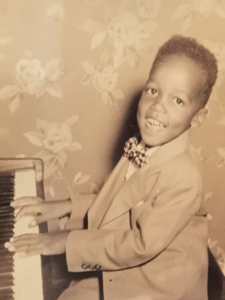
Danny Kelley
(Houston Chronicle) Driving to Cameron a couple of weeks ago, the little town southeast of Waco that had the audacity – with native-son Drayton McLane’s encouragement – to make a bid for Amazon’s second headquarters, I was mulling over my decades-old Cameron memories. As I’ve mentioned before in this space, Cameron was one of the little Central Texas towns I got to know long ago as my dad’s summer helper on his potato-chip route.
Before heading over to Rosebud after lunch to peddle our Creamer’s Clover-Fresh Potato Chips, we had several other stops to make, including a small grocery store in Cameron’s African-American neighborhood. The husband-and-wife owners lived in a house beside the store and had several children, including a little boy about my age who was a piano prodigy. More than once, his proud mother invited us into the house to listen to him play.
His name eventually faded away, but I occasionally wondered whether he had become a Fats Domino, a Duke Ellington, maybe a concert pianist touring the world.
“That’s Danny Kelley,” Milam County Judge Dave Barkemeyer told me. “He comes back home every now and then to play for special occasions.” (more)
Documentary: “A Sweeter Sugar”
How desegregation killed black college sports
 Howard University alumnus Bobby Spears Jr. has joined Haitian-American filmmaker Philippe (Phil) Roc to put together a documentary exploring how desegregation eroded black college sports to the point where top-tier black athletes now almost exclusively choose to attend predominantly white universities. Through their journey, we confront some ugly truths about amateur sports, exploitation, self-hate, and a divided America.
Howard University alumnus Bobby Spears Jr. has joined Haitian-American filmmaker Philippe (Phil) Roc to put together a documentary exploring how desegregation eroded black college sports to the point where top-tier black athletes now almost exclusively choose to attend predominantly white universities. Through their journey, we confront some ugly truths about amateur sports, exploitation, self-hate, and a divided America.
According to Spears: “I wanted to explore this strange phenomena in sports where in black athletes spend countless hours perfecting their craft in hopes of representing predominantly white universities in athletic endeavors. These endeavors generate billions of dollars that never recirculate to the black community. Odd isn’t it? The community supports the efforts of these families and athletes and in many cases the sole desire is that these athletes “get out”, which means they never come back and neither does the benefit of all that support. Why does the community not value itself?? Why is success defined as acceptance outside of the community??
“I…know that the conversation has a myriad of angles to it. We can all agree that there is no one right type of school for every type of student. I wanted to explore this subject from a personal, professional and academic point of view. I wanted to find out how this all came to be, what it means in this current day and time, and where we are headed in the future. As the son of a Jamaican immigrant, the son of a pre-Civil Rights era Southern gentleman and a second generation black entrepreneur I feel uniquely qualified to contribute to my community by exploring this story and many more like it. There is a movement ready to spark. I believe this film could be at the forefront.” (more)
For more information and to help fund the film’s production, please visit the documentary’s Indiegogo page.
Community archivist shares stories of Austin’s black community
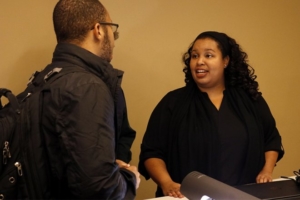
Accounting junior Alton Braxton, left, asks LaToya Devezin, African-American community archivist for the Austin History Center, a question after her talk on West Austin’s black history. (Credit: Hannah Simon, Daily Texan Staff)
(Daily Texan) Through pictures, film and storytelling, LaToya Devezin engrossed a full house of students and community members Tuesday evening (Dec. 5) as she told the stories of West Austin’s African-American communities.
Devezin, the African-American community archivist for the Austin History Center, spoke at the event Black Austin Re-Membered to explain the history of several historically black West Austin districts and how their histories must be preserved. Districts Wheatville, Clarksville and Kincheonville were established as communities after the Civil War, made up of recently freed slaves who created lives for themselves and established schools, churches and businesses, Devezin said.
“It’s important to remember these histories as we look at Austin, because Austin is this great place that’s welcoming,” Devezin said. “Everyone wants to come here, and it’s like the top on everyone’s list, but, at the top of those lists, sometimes, we don’t see everyone’s experiences.” (more)
Also: The Austin History Center African American Community Archivist actively seeks out archival materials from the African American community in Austin and Travis County through outreach efforts and programming. The Community Archivist also gives presentations, conducts oral history interviews, coordinates programs and events, provides reference service to the public and acts as a subject specialist in the history of Austin’s African American community.
Even Nazi prisoners of war in Texas were shocked at how black people were treated in the South
In Texas, some of the Germans actually befriended Americans of all colors
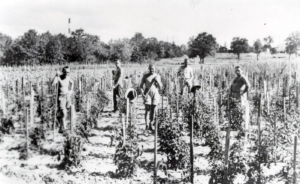
German POWs tend to local crops in Fort Bend County, Texas. (University of North Texas Libraries)
(Timeline.com) One morning in the spring of 1943, years before the end of World War II, Huntsville, Texas woke up to a startling sound: the clip-clapping boots of Nazi soldiers in formation, singing German marching songs as they made their way through the dusty streets of the small town.
Those soldiers were among the first prisoners of war sent to POW camps in the United States. The townspeople watched as barracks went up, surrounded by barbed wire and chain link fences, and wondered what, exactly, they were in for. Americans had only been in the war for a year when POW camps were being built, and residents of Huntsville had little time to prepare for the reality of thousands of Nazi prisoners taking up residence just eight miles from the town limits.
The POWs found friends in the most unlikely of places, as they worked alongside African Americans hoeing and picking cotton, talking away long days in the hot sun. African American field hands were painfully aware that white Americans treated Nazi prisoners far better than they did people of color. African Americans waited on POWs when they were transported in Pullman cars to their camps, and prisoners were also allowed to eat in whites-only cafeterias. At the camp, they were dealt the most menial jobs, including spraying the prisoners with delousing foam. The slights hurt all the more because African-American soldiers fought diligently during WWII in all-black units such as the renowned Tuskegee airmen. (more)
TIPHC Bookshelf
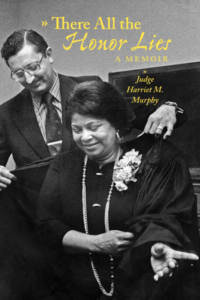 Published scholarship on black history in Texas is growing and we’d like to share with you some suggested readings, both current and past, from some of the preeminent history scholars in Texas and beyond. We invite you to take a look at our bookshelf page – including a featured selection – and check back as the list grows. A different selection will be featured each week. We welcome suggestions and reviews. This week, we offer, “There All the Honor Lies,” by Harriet M. Murphy.
Published scholarship on black history in Texas is growing and we’d like to share with you some suggested readings, both current and past, from some of the preeminent history scholars in Texas and beyond. We invite you to take a look at our bookshelf page – including a featured selection – and check back as the list grows. A different selection will be featured each week. We welcome suggestions and reviews. This week, we offer, “There All the Honor Lies,” by Harriet M. Murphy.
This autobiography of the first permanently appointed female African American judge in Texas, Harriet M. Murphy, is the story not only of an African American woman who grew up in the 1930s and 1940s, but of the civil rights movement. Judge Murphy began fighting injustice and inequality early in her life. Through her work with the NAACP and the Urban League, she sought social change at the local level. She recounts meetings with civil rights icons, including W. E. B. DuBois, Martin Luther King Jr., and Thurgood Marshall. Though caught up in activism, she found time to pursue her dream of becoming a lawyer.
There All the Honor Lies details some of Murphy’s most notable accomplishments, including instituting a partial payment plan for constituents who were fined by the municipal court and chairing the city of Austin’s first detoxification task force. Since retiring from the bench, Murphy has run for the Austin City Council and been inducted into the National Bar Association Hall of Fame.
This Week in Texas Black History, Dec. 10-16
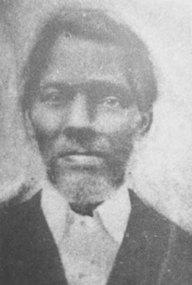
Jacob Fontaine
Dec10
This day marks the passing of Rev. Jacob Fontaine in 1898. Born in Arkansas, Fontaine was a Baptist minister, publisher, and community leader who came to Austin in 1839 with his owner, Rev. Edward Fontaine, who served as personal secretary for Texas president Mirabeau B. Lamar. In 1867, Jacob Fontaine founded the First Baptist Church (Colored) on the same property where the Austin History Center now sits. In 1876, he established the Gold Dollar, one of the first black weekly newspapers in the South and the first newspaper under black ownership in Austin. He also participated in the founding of five African-American churches as well as the St. John Regular Missionary Baptist Association.

Kevin Sumlin
Dec10
On this day in 2011, Kevin Sumlin became the first black head football coach at Texas A&M University. In his first year as the Aggies’ head coach, Sumlin led A&M to a No. 5 national ranking and the program’s first 11-win season since 1998. Sumlin was a national coach of the year finalist and coached the first-ever freshman to win the Heisman Trophy – quarterback Johnny Manziel. Sumlin went to Texas A&M after leading the University of Houston Cougars to a school-record 13 victories and the program’s highest finish (No. 20) in the Bowl Championship Series standings in 2011. Sumlin posted a 35-17 overall record and led the Cougars to three bowl games fueled by his high-powered offense that led the nation in passing, total and scoring offense that set NCAA FBS team records for total offense and passing yards. When hired at UH in 2008, Sumlin became the first African-American head football coach at a NCAA Division I school in the state of Texas. Sumlin was born in Brewton, Alabama, however graduated high school in Indianapolis and attended Purdue University, graduating in 1988 with a bachelor’s degree in both criminology and criminal justice. He was a standout linebacker for the Boilermakers.

Heman Sweatt
Dec11
On this day in 1912, Heman Marion Sweatt was born in Houston. In 1946, Sweatt, a graduate of Wiley College, challenged the admissions policy at the University of Texas law school. He teamed with the NAACP, which was looking to test separate but equal education statutes in Texas. Sweatt’s legal battle struck down segregationist policies at the UT law school, gained him admission, and paved the way for the landmark decision of Brown v. Board of Education in 1954.
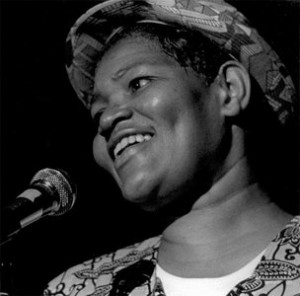
Willie Mae “Big Mama” Thornton
Dec11
Texas blues pioneer Willie Mae “Big Mama” Thornton was born on this day in 1926 in Montgomery, Alabama. Thornton left home in 1941 to pursue her musical career, eventually settling in Houston in 1948. Her 1952 recording of “Hound Dog” was later a huge hit for Elvis Presley, and her song “Ball and Chain” was made famous by Janis Joplin.
Dec12
The Ashworth Act was passed by the Texas Congress on this day in 1840 in response to an act passed on February 5, 1840 which prohibited free blacks from living in the Republic of Texas. The Ashworth Act was targeted towards certain free blacks (primarily a family of blacks named Ashworth who had “contributed generously” during the Texas Revolution), but generally said that “all free persons of color together with their families, who were residing in Texas the day of the state’s Declaration of Independence” (March 2, 1836) could remain in the state. Other free blacks had two years to vacate Texas or be sold into slavery.

Jamie Foxx
Dec13
On this day in 1967, actor and comedian Eric Marlon Bishop was born in Terrell. In 1989, Bishop changed his name to Jamie Foxx in an effort to get more performance time as a stand-up comic at a Los Angeles club. As an actor, he became the first African American to receive two acting Oscar nominations in the same year (2004) for two different movies, Collateral and Ray.
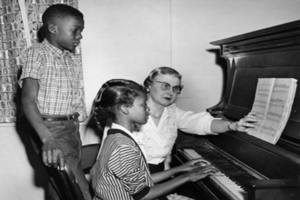
Iola Bowden Chambers
Dec14
On this day in 1978, Iola Bowden Chambers, co-founder and director of the Negro Fine Arts School in Georgetown, died in Brownwood. Bowden was a native of Holder and received a diploma in piano in 1926 from the Washington Conservatory of Music. She returned to Texas and taught music at Southwestern University where she and three of her students began teaching piano to black children in Georgetown as the Negro Fine Arts School. The program was sponsored by the Student Christian Association at Southwestern University and classes were held at the First Methodist Church of Georgetown. Over 200 students participated in the school during its existence from 1946 to 1966. The program held an annual recital but also awarded college scholarships. One former teacher said the basic impact of the organization was “the realization of the power of music as a universal language to transcend racial and cultural barriers.”
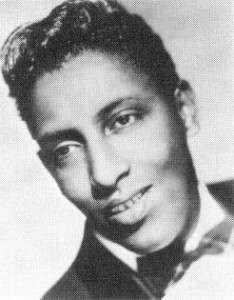
Jesse Belvin
Dec15
Jesse Belvin, R&B singer and songwriter, was born on this day in San Antonio (some accounts say Texarkana, Texas). At the age of five, Belvin moved with his family to Los Angeles. Known by some as the “Black Elvis,” Belvin’s most popular hit was “Good Night My Love,” which reached No. 7 on the R&B charts in 1956. He also wrote the song “Earth Angel” which was a hit for the Penguins and sold over a million copies in 1954.
Blog: Ron Goodwin, Ph.D., author, PVAMU history professor
Ron Goodwin’s bi-weekly blog appears exclusively for TIPHC. Goodwin is a San Antonio native and Air Force veteran. Generally, his column addresses contemporary issues in the black community and how they relate to black history. He and the TIPHC staff welcome your comments.
Latest Entries
A New Hope
Forgive me for borrowing the title of one of the most profitable films in history, “Star Wars: A New Hope.” I’ve always been enamored by space. I’m a child of the 1960s and I remember playing with my Major Matt Mason action figure (not a doll!) as my family [...]
Tell me the truth
Democracy – a) government by the people, b) a government in which the supreme power is vested in the people and exercised by them, directly or indirectly through a system of representation usually involving periodically held free elections. Merriam-Webster Dictionary There were many things I learned from my father. [...]
Submissions Wanted
Historians, scholars, students, lend us your…writings. Help us produce the most comprehensive documentation ever undertaken for the African American experience in Texas. We encourage you to contribute items about people, places, events, issues, politics/legislation, sports, entertainment, religion, etc., as general entries or essays. Our documentation is wide-ranging and diverse, and you may research and write about the subject of your interest or, to start, please consult our list of suggested biographical entries and see submission guidelines. However, all topics must be approved by TIPHC editors before beginning your research/writing.
We welcome your questions or comments. Please contact Mr. Michael Hurd, Director of TIPHC, at mdhurd@pvamu.edu.
